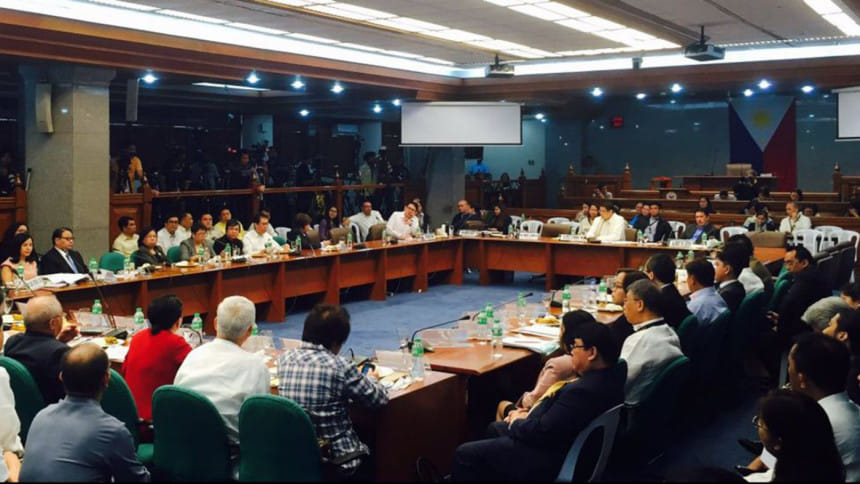Stop payment orders from BB 'vague': RCBC

Philippines-based Rizal Commercial Banking Corporation (RCBC) today said the bank could have held the stolen US$81 million if only the Bangladesh Bank sent "high priority messages."
Macel Estavillo, the head of legal and regulatory affairs of RCBC, said that although Bangladesh Bank did send three requests for freeze on February 9, the messages were "vague" and "ambiguous", reports ABS-CBN News.
RCBC: Stop payment orders from Bangladesh 'vague' https://t.co/xo7n6CqWGg #MoneyLaundering pic.twitter.com/SWCIDR9ys5
— ABS-CBN News Channel (@ANCALERTS) April 12, 2016
Estavillo said RCBC could've reacted promptly if it received an MT192, the code for a request for cancellation or stop payment order.
“In the case of the bank of Bangladesh, they did not send us any high priority message, they did not send us any stop payment order. They just sent us an unauthenticated free format message or a 999,” Estavillo told senators at the Senate Blue Ribbon investigation on the money laundering scandal, the newspaper reports.
Estavillo said that on February 9, the banking day after a 3-day-long weekend, RCBC received a total of 790 messages in the SWIFT system, but none of which was an MT192.
Find out how a global messaging system played a role in how millions of dollars in laundered money went through it. https://t.co/OKBnL05g58
— CNN Philippines (@cnnphilippines) April 12, 2016
SWIFT, that stands for the Society for Worldwide Interbank Financial Telecommunications, is the messaging system used by banks worldwide to transmit funds.
Because there were no apparent red flags, Estavillo said all messages were deemed of "normal priority" and were thus opened sequentially, it adds.
She said that at 11:22 am on February 9, the bank's settlements department opened and read an MT999, or a bank-to-bank text message, recalling funds sent to the account of a certain "Alfred Santos Vergara." The account was later discovered by RCBC to be fictitious.
The MT999 was forwarded to RCBC Jupiter, Makati branch.
Estavillo said the "normal priority" message from Bangladesh Bank read: "Please be informed that this is a doubtful transaction. You are requested to stop the payment and if you already made payment then freeze the account of the beneficiary for proper investigation. We think the transaction is contradictory with the anti-money laundering law."
However, Estavillo said that three minutes earlier at 11:19am, $19.95 million was already transferred to the supposed account of William Go, which was also discovered later by RCBC to be an unauthorized account.
Estavillo said a similar recall message from Bangladesh Bank was read by the settlements department at 11:25 am in relation to the "Enrico Teodoro Vasquez" account. It was also sent to RCBC Jupiter branch.
But Estavillo said at 10:24am, $15.216 million from the Vasquez account was already transferred to another account. Estavillo said the receiving account refused to sign a waiver, and therefore hinders RCBC from discussing details of the transaction.
At 11:34am, or nine minutes after the message from Bangladesh Bank was received, another transfer from the Vasquez account, this time to Go's account, was made for $9.76 million.
The third freeze order request from Bangladesh was read at 11:30 am on February 9 pertaining to the account of a certain Christopher Lagrosas.
But Estavillo said the transfer of funds of $22.7 million was already made from the Lagrosas account to Go's account on February 5 at 3:16 pm
Another transfer of $7.23 million was made to Go's account five minutes after the bank read the freeze order request at 11:35 am
According to Estavillo, there was nothing to indicate that the messages were sent by the central bank of Bangladesh.
“We didn’t know that they were the central bank of Bangladesh, we just thought they were a regular bank,” she said.
February 10 Message
She noted that alarm bells only rang on February 10, when the wording of the messages from Bangladesh became clearer.
The "normal priority" message, pertaining to the account of Michael Francisco Cruz, was read by RCBC head office at 2:41pm.
Estavillo said the message from Bangladesh Bank on February 10 read: “Please be informed that this is a fraudulent transaction and unauthorized access in our SWIFT system. So you are requested to stop the payment and if you have already made the payment, then freeze the account of beneficiary."
Estavillo said the message sent on February 10 was more direct compared to the messages sent on February 9, which she said "used very vague terms."
"Perhaps it was also not clear to them what had happened on February 9, because it was not clear based on their emails sent. We have received many stop payment orders but never as ambiguous as these messages,” she said.
Estavillo stressed that because Go's account was a private account, RCBC did not have any authority to freeze the account and stop the withdrawal.
She also noted that the branch manager at RCBC Jupiter, Maia Santos-Deguito, could have also alerted the head office, but decided to push through with the transactions.
“Maia Deguito, when she received the first of these messages, rushed to expedite the withdrawals as well. At the end of it, she said, it is better for her to expedite than to have herself and her family killed. It is in that context that even if she received the freeze orders, she still continued to withdraw about $16 million afterwards,” said Estavillo.
Deguito is facing money-laundering charges filed by the Anti-Money Laundering Council (AMLC).
Estavillo believes the Anti-Money Laundering Act should be amended to give banks "holding power" in questionable transactions.
Bangko Sentral ng Pilipinas (BSP) deputy governor Nestor Espenilla, meanwhile, said RCBC may face a maximum fine of P30,000 per day or per transaction for failing to act on the order.
Aside from monetary penalties, Espenilla said BSP may also impose non-monetary sanctions if the bank is found guilty of negligence.

 For all latest news, follow The Daily Star's Google News channel.
For all latest news, follow The Daily Star's Google News channel. 








Comments